The body needs a sufficient amount of protein each day to function properly. Protein is necessary for your body to function properly and remain healthy. High-protein foods can help you get the protein you need each day.
Protein is also an essential component of the mechanisms that provide you with energy & allow your blood to transport substances throughout your body.
Studies have shown that the term “protein” refers to a broad class of molecules. Your cells depend on them for immune system performance, mobility, chemical reactions, hormone synthesis, and other processes. They also provide structure and support for your cells.
Protein should be a part of your diet if you want to feel full after eating, promote the development of your muscles, maintain the health of your bones, and boost your immune system. General Health and well-being are supported by healthy fats and carbohydrates. However, getting enough protein should be a top priority since it is necessary for numerous bodily functions.
In fact, a 2018 study that was published in Frontiers in Endocrinology demonstrated that protein-rich foods are associated with a number of advantages, including maintaining bone health, assisting in the management of blood sugar levels, and boosting weight loss.
Everybody can get the recommended amount of protein by routinely consuming high-protein foods, even if some people do need more protein than others. Being the most filling macronutrient, protein is not only necessary for good health overall but can also help you maintain healthy body weight by keeping you feeling satisfied and full.
What is Protein?
You have undoubtedly heard the phrase protein before if you’ve ever been on a diet or discussed nutrition with someone. While many individuals are aware of the value of protein, they might not be familiar with its exact definition.
The many amino acids that make up the proteins we consume are known as the building blocks of protein. The body requires these amino acids for a variety of processes, including the production of certain hormones and the construction of particular proteins.
Therefore, the amino acids that made up the protein are absorbed and utilized by cells for a variety of purposes when the body digests the full protein we get from our juicy hamburger or from a hearty lentil soup.
If a person chooses the appropriate high-protein foods, they can have all of the essential amino acids their body requires, whether they are a carnivore, a vegan, or somewhere in between. If you’re seeking protein-rich foods, we’ll show you the best 18 high-protein foods in this post.
How much Protein do you need?
Although one of the most essential nutrients to consume is protein, this does not mean that you need to consume large amounts of it every day. The amount of protein you should eat each day depends on a number of factors, including:
- Pregnancy Status
- Age
- Activity Levels
- Body Size
- Health status
- Sex
- Weight
In general, healthy adults need 0.8 grams of protein for every kilogram of body weight. For a sedentary male of average weight, this amounts to 55 grams per day, and for a sedentary woman of average weight, it translates to 45 grams per day.
Generally, it’s wonderful if you feel full and satisfied after a meal or in between meals, but if you always feel hungry or are having trouble recovering from exercises, illnesses, or injuries, you may need to increase your protein intake or adjust the time of when you eat protein-rich foods.
Read this Blog- 7 Scientifically Proven Health Benefits of Apple Cider Vinegar
18 Delicious High-Protein Foods
The majority of the foods you already eat every day include protein. Smaller amounts of this macronutrient can be found in foods including rice, vegetables, and other grains. Other foods with high sources of protein can provide your body with essential nutrients if they are incorporated into a healthy diet overall.
People can lose weight by eating high-protein foods since they can prevent overeating. When paired with exercise, a high-protein diet can aid in the development of lean muscle. Lean muscle aids in increased daily calorie expenditure, which can aid in weight loss.
The 18 best high-protein foods to include in your daily diet for the body’s general development are listed below:
1. Cottage Cheese
Cottage cheese is included in the category of high-protein foods that are generally low in calories and fat but high in protein. It also offers a healthful serving of calcium and other nutrients.
If you’re a vegetarian seeking an egg substitute, cottage cheese is a must because it has more protein per serving than two eggs. In accordance with research, cottage cheese is equally as filling as eggs, making it a fantastic alternative for satisfying high-protein meals or healthy snacks for weight loss.
The majority of diets for losing weight include cottage cheese as it is regarded as a high-protein, low-calorie item that can keep you satisfied for a long period of time during the day.
Protein Content- One cup of low-fat cottage cheese has a whopping 28 grams of Protein and only 163 calories. (Trusted Source)
Cheddar cheese, which has 3.96 grams of protein per 17 grams slice, can also be eaten if you’re looking for additional protein-rich foods like cottage cheese
2. Almonds
Almonds are an excellent source of protein, fiber, healthy fats, magnesium, and vitamin E. They are a type of tree nut. (Trusted Source)
According to various studies, Almond consumption has numerous health advantages. Lowering cholesterol, blood pressure, and blood sugar levels are a few of them. Additionally, they can lessen hunger and encourage weight loss.
For a boost of full protein and fiber, try adding some almonds to plant-based meals like grain bowls and salads.
Consider including pistachios and cashews in your diet if you want to increase your intake of nuts. These two wholesome nuts are both loaded with protein.
Protein Content- The Nutrient Data Laboratory of the United States Department of Agriculture estimates that one almond has 0.25 grams of protein. So you get roughly 2.5 grams of protein by eating 10 almonds.
Other high-protein nuts are cashews, which offer 4.34 grams of protein for every 1-ounce (28.35 grams) meal, and pistachios, which provide 5.73 grams per serving. (Trusted Sources 1, 2)
3. Lean Beef
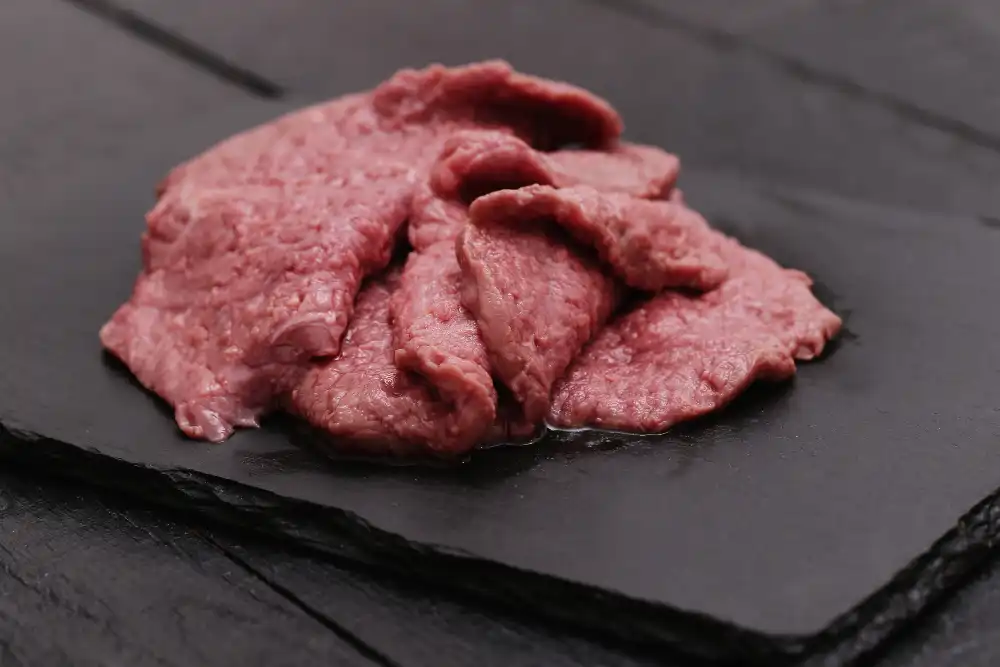
Lean beef is the culinary term for beef meat. Meats with high protein content and little fat are known as lean beef. It is also high in bioavailable iron, zinc, selenium, vitamin B12, and B6, according to certain research.
One of the best sources of protein is lean beef, and since only a tiny amount of lean beef may give you the protein you require, you don’t need to consume a lot of it to get a high-protein diet.
Red meat can also be included in the category of high-protein foods, but it’s recommended to limit your consumption because it’s been shown that eating too much of it can lead to disorders like colorectal cancer. Therefore, eating fish, lean beef, and plant-based protein can be advantageous if you’re seeking protein-rich foods.
Protein Content- According to research, a 3-ounce (85-gram) serving of lean beef has 24.6 grams of protein in it.
4. Milk
Dairy milk is deficient in practically all nutrients that are important for maintaining bodily health. It is also regarded as a “complete protein”, which means that it contains all nine of the important amino acids your body needs to operate at its best.
Milk is considered one of the best high-protein foods and it is also high in vitamins and minerals like calcium, phosphorus, and riboflavin (Vitamin B12 )
Some studies indicate that many people who have lactose intolerance are unable to consume milk and other dairy products and steer clear of a variety of meals that include dairy. In these situations, individuals can consume a variety of lactose-free goods, including lactose-free milk, cheeses, yogurts, and other items that are now on the market.
Consuming these items can be a terrific alternative because they are the best sources of protein and are lactose-free.
Protein Content- Several studies show that one cup (246 mL) of dairy milk has 8.32 grams of protein.
5. Eggs
Eggs, especially raw eggs, are one of the best sources of protein and one of the healthiest meals out there. They outperform other foods in terms of some important micronutrients, such as Vitamin A and Choline, if you’re looking for a nutrient-dense food and high-protein foods option.
While whole eggs with yolks contain many nutrients such as vitamins, minerals, antioxidants, and healthy fats, egg whites are nearly pure protein. Many studies have also demonstrated that whole eggs are quite healthy for most people and may even help prevent chronic diseases.
Protein Content- According to one study, there are 6.3 grams of protein in one big egg (50 grams).
6. Pumpkin Seeds
In addition to being one of the best sources of protein, pumpkin seeds also include the energy-boosting minerals phosphorus, zinc, and magnesium. (Trusted Source) Additionally, they are a great source of vitamins, minerals, and unsaturated fatty acids, all of which lower the risk factors for cancer and other chronic diseases.
Flax seeds, chia seeds, and sunflower seeds are your options if you don’t want to eat pumpkin seeds and are searching for additional high-protein foods in the form of seeds.
Attempt adding pumpkin seeds to salads, baked goods, porridge, or yogurt. You can also combine them with almonds and unsweetened dried fruit to make a quick snack.
Protein Content- You can get 9 grams of protein from 30 grams of pumpkin seeds, which is more than there is in one egg.
7. Tofu
Tofu, or bean curd, is a vegetarian and vegan staple and with good reason. Soyabean-based tofu is a superior plant based complete protein that holds all nine amino acids essential for your body to fix muscles, produce hormones and maintain immune function.
A 100 gram serving of firm Tofu provides approximately 10-15 grams of protein, depending on water content and degree of firmness. In addition to protein, Tofu contains iron, calcium (if calcium set), magnesium and phosphorus, all of which are essential for bone well being and energy metabolism.
It’s also a rich source of isoflavones, natural plant nutrients that have antioxidant effects and can promote cardiovascular health, lower inflammation, and regulate hormones— especially in women going through menopause.
Tofu’s greatest advantage is that it is extremely versatile. It picks up flavors effortlessly from marinades, sauces and seasonings, so it’s easily used for almost any kind of cuisine — from Asian stir-fries to vegan tacos and protein packed smoothies. You can barbecue it, bake it, sauté it or even scramble it as an egg substitute.
Tofu is low in calories, cholesterol free, and gluten-free and dairy-free safe, and is an intelligent and inclusive protein option for most lifestyles.
Protein Content- When it comes to protein content, firm tofu has about 15.7g of protein in 100g and extra firm tofu has about 17.3g of protein in 100g. On the other hand, silken tofu contains fewer because it contains more water and supplies around 4.8g of protein per 100g.
8. Brussels sprouts
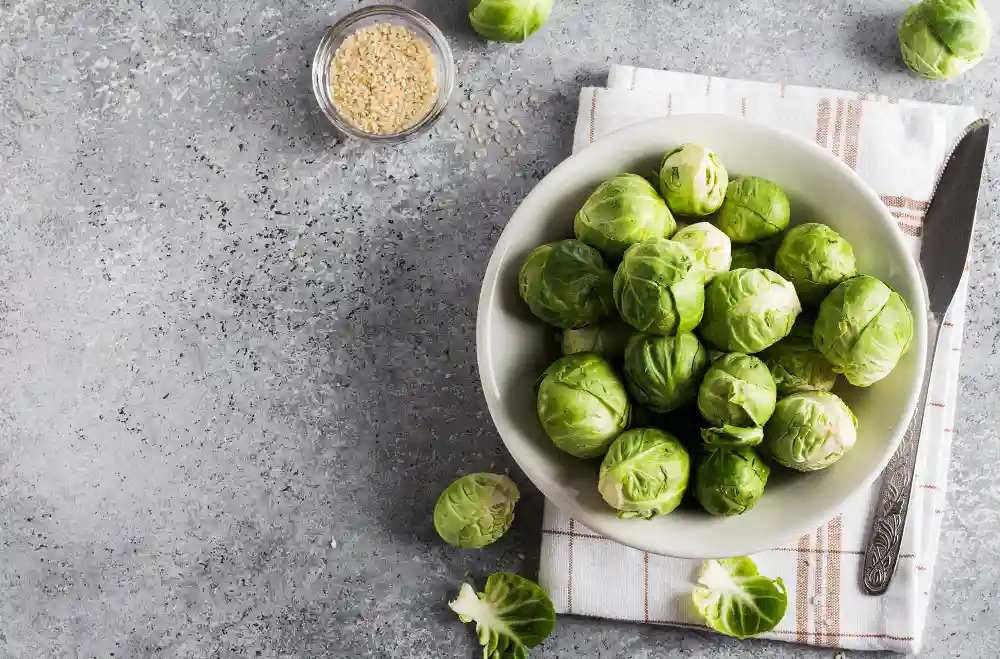
One of the best sources of protein is Brussels sprouts. They are among the most effective superfoods for cold weather and are high in fiber. Brussels sprouts are rich in glucosinolates, which fight cancer, and vitamin C, which strengthens the immune system.
If you’re seeking vegetarian high-protein foods, you can incorporate these low-calorie, high-protein, and nutritionally packed vegetables in your regular diet.
Protein Content- A study found that 100 grams, or one cup, of Brussels sprouts, provide 3.98 gm of protein.
9. Lentils
If you’re looking for foods high in plant-based protein or the best protein foods, Lentils must be a part of your diet. Lentils are one of the best forms of plant-based protein you can eat, making them a perfect choice if you follow a vegetarian or vegan diet.
Compared to lean beef, lentils are a more nutrient-dense food and the best source of fiber, protein, vitamins, and minerals. It is a low-calorie, high-protein food that may help you feel filled for longer during the day and help in your weight loss journey.
According to studies, individuals who frequently consume lentils and other legumes have a lower risk of heart disease and fatty liver disease.
Protein Content- According to the study, A ½ cup serving of cooked lentils has roughly 12 grams of protein. With such a high protein content, you’ll be energized all day.
10. Shellfish
Shellfish including shrimp, oysters, clams, and scallops are some high sources of protein. They are high in protein and omega-3 fatty acids while being low in calories. They are also high in certain micronutrients, such as iron, zinc, magnesium, and vitamin B12. (Trusted Source)
The protein content of shellfish is high. Salads, pasta dishes, and stir-fries all taste good with them. Scallops are the shellfish with the highest protein content. 1 Serving of scallops contains 29 gm of protein.
Protein Content- A 3-ounce (85-gram) meal of cooked clams has 21.8 grams of protein, whereas a similar amount of shrimp has 20.4 grams of protein, said the study.
11. Greek Yogurt
Greek yogurt, also known as strained yogurt, is a particularly thick variety of yogurt that makes it one of the top high-protein foods.
Some studies claim that it has a creamy texture and is a good source of numerous nutrients, including calcium, vitamin B12, vitamin A, selenium, and zinc.
It’s a versatile kitchen item because of its somewhat tangy flavor, which goes well with both sweet and savory meals. Greek yogurt can be used to make smoothies, soups, salad dressings, and baked products. It can also be eaten on its own with a piece of fruit and some chopped nuts for crunch.
Protein Content- Greek yogurt has 20 grams of protein in every 7-ounce (200-gram) serving, making it one of the best sources of protein.
12. Turkey Breast
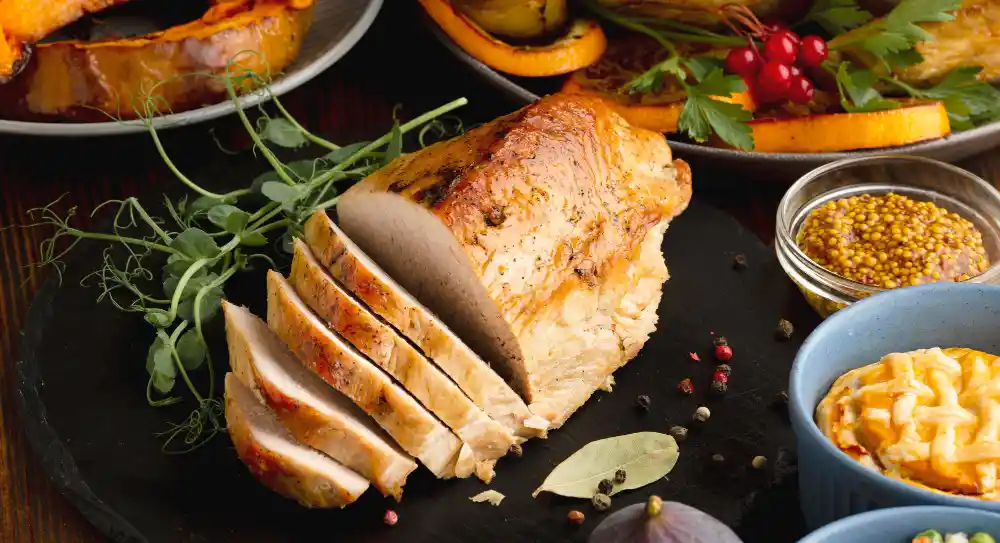
Turkey breast is the meat from the turkey’s chest, and it resembles chicken breast in many ways.
According to the US Department of Agriculture, it has a high protein content, very little fat, and few calories. It also contains significant amounts of selenium, zinc, vitamins B12 and B6, as well as other vitamins and minerals.
In general, turkey chicken has a slightly greater percentage of iron and tends to have fewer calories, fat, and sodium than chicken. To enhance the protein value of your meals, you can add turkey breast to soups and grain dishes in addition to adding it to salads and sandwiches.
Protein Content- According to the US Department of Agriculture, 3 ounces (85 grams) of turkey has 25.6 grams of protein in it.
13. Chickpeas
Chickpeas are a fantastic source of plant-based protein, so if you follow a vegan or vegetarian diet and are searching for plant-based, high-protein foods, add them to your diet.
They are also a great source of fiber, vitamin B, protein, carbohydrates, and several minerals. Additionally, they may help with weight control, enhance digestion, and lower the chance of contracting certain illnesses.
Protein Content- 3.5 ounces (100 grams) of chickpeas have 20.5 grams of protein in them, according to FoodData Central search results.
14. Chicken Breast
If you want to increase your protein consumption or are looking for foods high in protein, chicken breast is a great option.
In addition to protein, A study by FoodData Central found that chicken breast also contains a variety of Vitamin B vitamins as well as minerals including zinc and selenium.
Furthermore, cooking chicken breast is simple and quite adaptable. It can taste fantastic in a variety of recipes. To make salads, stir-fries, and soups more full, try adding sliced chicken breast to them.
Protein Content- A half of a chicken breast (86 grams) has 26.7 grams of protein, according to research by FoodData Central.
15. Protein Powders
When you don’t have enough time to properly consume high-protein foods and are short on time, protein powder may be able to help.
Protein powders like whey and pea protein can be simply added to shakes, smoothies, energy balls, yogurt, and other foods to boost their protein and satiation levels. However, Whey protein and pea protein are both excellent choices if you’re looking for meals that are high in protein.
Protein Content- According to the research conducted by FoodData Central, Pea protein delivers 15 grams of protein per scoop, compared to 16.6 grams in 28.6 grams of whey protein powder (20 grams)
16. Fish
According to several research, fish is one of the best sources of protein and is a good source of essential vitamins and minerals like iodine, selenium, and vitamin B12.
Fish is an important source of omega-3 fatty acids. The essential nutrients present in the fish keep your heart and brain health. Studies show that those who consume a lot of fish have a lower risk of developing diseases like heart disease and type 2 diabetes.
Protein Content- Among the best sources of protein is fish protein. About 17 grams of protein are included in a 3-ounce plate of fish.
Of all the seafood on the list, tuna fish offers the greatest protein per gram. Each 100-gram serving of Tuna Fresh contains 30 grams of protein.
17. Avocado
Avocados are a nutrient-rich fruit commonly referred to as a superfood due to their many health benefits. In addition to having a lot of fiber and good fats, avocados are amongst the best sources of protein.
Avocados are a fantastic source of nutrients like potassium, magnesium, folate, vitamin C, vitamin E, good fats, fiber, and many others. They might improve the overall standard of your diet if you consume them frequently.
Avocado is also a versatile fruit that works well in a variety of dishes, such as salads, smoothies, and sandwiches. Therefore, think about including avocado in your meals if you’re looking for a tasty and healthy method to increase your protein intake.
Protein Content- According to a study by FoodData Central, a 100-gram serving of Avocado has about 2 grams of protein making it a great food for vegetarians and vegans non-vegetarians source of Food.
18. Quinoa
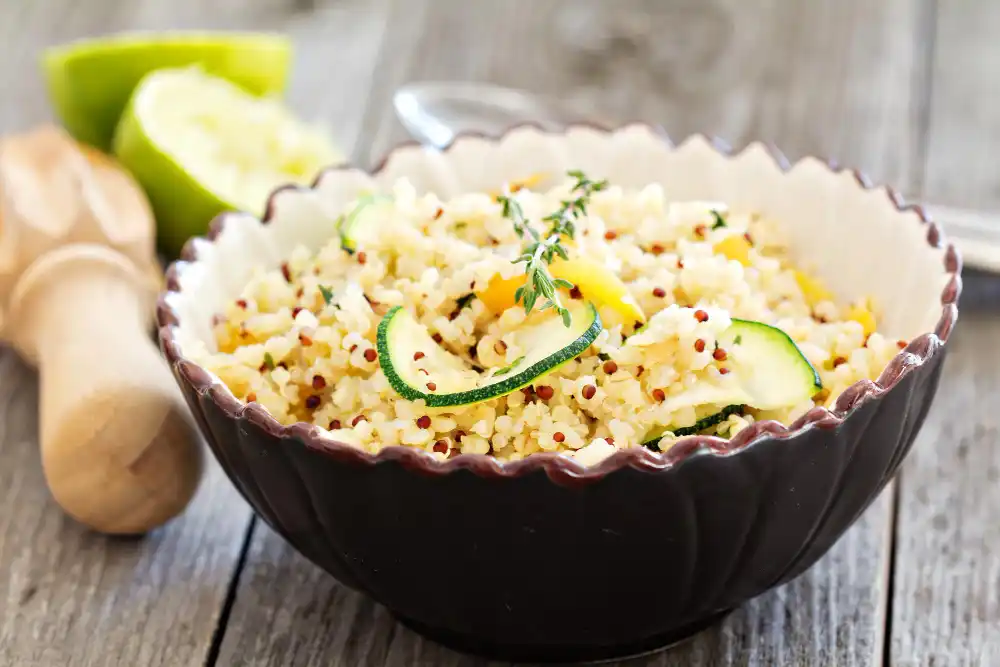
Quinoa is commonly thought of as a grain, but it is truly a seed, which is why it is also classified as a pseudocereal. It is also very famous in the world of wellness.
According to the research done by Food Data Central, Quinoa is a nutrient-dense meal that is higher in protein than many grains and abundant in fiber, folate, copper, iron, and zinc.
As a versatile ingredient, quinoa can be used in a wide range of recipes, such as salads, stir-fries, and morning bowls. It is also a popular superfood in today’s market for a reason: it has a nutty taste and an adaptable texture.
Therefore, if you want a tasty and healthy method to increase your protein intake and still searching for high-protein foods, think about including Quinoa in your diet.
Protein Content- According to a study done by Food data Central, One cup (185 grams) of prepared quinoa has 8 grams of protein per serving.
19. Oats
Oats are more than a morning staple —– they’re a greatly underappreciated source of plant protein. A half-cup (40g) of rolled oats or oatmeal contains about 5g of protein, supplemented by a healthy amount of complex carbohydrates and soluble fiber, particularly beta-glucan, which lowers cholesterol and aids heart health.
Though oats are not a complete protein by themselves they can be mixed with other food such as nuts, seeds or dairy products in order to make a protein complete meal. For example; adding almond butter, chia seeds, or Greek yogurt on top of your oats can greatly add your protein to your breakfast.
Oats are also extremely versatile. You can have them as hot oatmeal, overnight oats, smoothies with protein powder, even make oat flour and bake protein bars, pancakes or muffins. They are naturally gluten-free (although cross-contamination can happen in processing, so seek out certified gluten free if necessary).
Beyond protein, oats are high in magnesium, zinc, iron and B vitamins that aid metabolism and energy production. Their slowly digested carbohydrates keep you feeling full for a longer period, which makes them a great food for weight loss and blood sugar regulation.
Overall, Oats are the healthy, filling and affordable way to fuel your day with protein and nutrients.
Protein Content:- Half a cup (40grams) of dry oats has a protein content of about 5 grams per serving. Prepared with milk or topped with seeds and nuts, the overall protein content can be much higher, making oats a healthy and satiating choice for any meal.
Bottom Line Or Conclusion
In conclusion, consuming or incorporating high-protein foods is crucial for sustaining your health and wellness.
Protein is essential for the building and repair of tissues as well as the growth and development of muscles, bones, and organs. By adding a range of protein-rich foods to your meals, you can ensure that your body gets the nutrition it needs to thrive.
When it comes to high-protein foods, there is a wide range of delicious and nutritious options to select from, including lean meats and fish as well as plant-based options like quinoa and legumes.
Therefore, make sure to include some of these best sources of protein and foods high in protein in your daily diet, if you’re trying to gain muscle, lose weight, or simply enhance your general health.










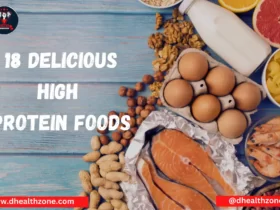
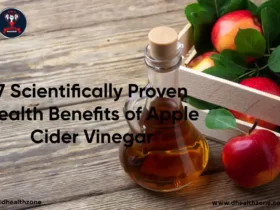
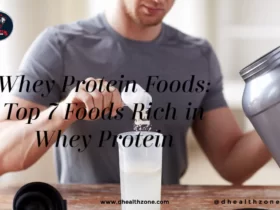
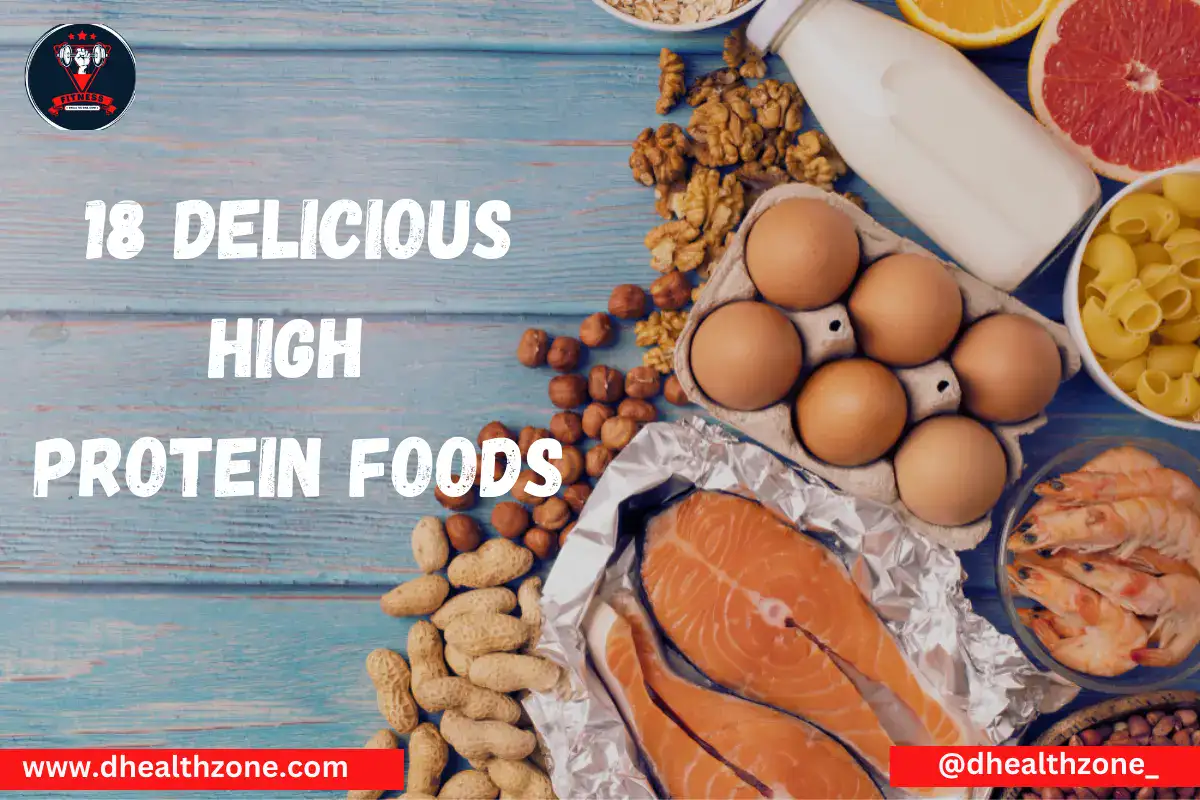



Leave a Reply